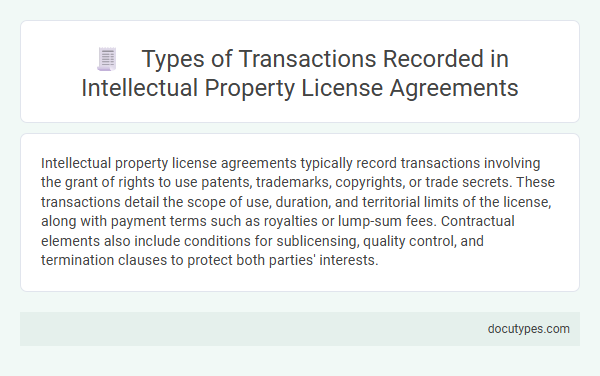Intellectual property license agreements typically record transactions involving the grant of rights to use patents, trademarks, copyrights, or trade secrets. These transactions detail the scope of use, duration, and territorial limits of the license, along with payment terms such as royalties or lump-sum fees. Contractual elements also include conditions for sublicensing, quality control, and termination clauses to protect both parties' interests.
Introduction to Intellectual Property License Transactions
What types of transactions are recorded in intellectual property license agreements? Intellectual property license agreements document the transfer of rights to use patents, trademarks, copyrights, or trade secrets under specific terms. These transactions define the scope, duration, and financial arrangements involved in licensing intellectual property.
Outright Sale Transactions
Intellectual property license agreements document various transaction types, including outright sale transactions. These transactions involve the complete transfer of IP rights from the licensor to the licensee.
- Complete Ownership Transfer - Outright sale transactions record the full assignment of intellectual property rights to the buyer without retaining any rights by the original owner.
- One-Time Payment Terms - These agreements often specify a lump-sum payment as consideration for the permanent transfer of IP assets.
- Exclusivity Clauses - The agreement details exclusive ownership rights, limiting the original owner from using or licensing the intellectual property further.
Outright sale transactions create a clear distinction between licensing and ownership of intellectual property rights within license agreements.
Exclusive License Agreements
Intellectual property license agreements document the transfer and use of rights related to patents, trademarks, copyrights, or trade secrets. Exclusive license agreements specifically grant the licensee sole rights to exploit the intellectual property within defined parameters.
Exclusive license agreements record transactions such as the granting of usage rights, territorial limitations, and the scope of permitted activities. They detail financial terms including royalties, upfront fees, and milestone payments. These agreements also specify the duration, renewal conditions, and any sublicensing permissions.
Non-Exclusive License Arrangements
Intellectual property license agreements typically record transactions involving the grant of rights, payment terms, and usage conditions. In non-exclusive license arrangements, multiple licensees can use the intellectual property simultaneously, making rights allocation and royalty structures essential. You should ensure the agreement clearly specifies these terms to protect your interests and maintain compliance.
Sublicensing Transactions
Intellectual property license agreements record various types of transactions, including sublicensing, where the licensee obtains permission to grant rights to a third party. Sublicensing transactions outline the scope, limitations, and financial terms associated with these extended rights. You must carefully review these provisions to ensure compliance and protect your interests in the intellectual property.
Cross-Licensing Agreements
Intellectual property license agreements document a variety of transaction types involving the use, transfer, or sharing of IP rights. Cross-licensing agreements specifically record reciprocal rights granted between parties to use each other's intellectual property, fostering collaborative innovation.
- Grant of Rights - Details the specific IP rights each party is licensing to the other, including patents, trademarks, or copyrights.
- Scope of Use - Defines how the licensed IP can be used, including limitations on territory, duration, and fields of use.
- Royalty and Payment Terms - Specifies any fees, royalties, or revenue-sharing arrangements related to the exchange of IP rights within the cross-licensing framework.
Royalty-Based Transaction Types
Intellectual property license agreements commonly record royalty-based transaction types to outline payment structures clearly. These transactions include fixed royalties, percentage of sales, or per-unit fees linked to the licensed IP usage.
Royalty-based agreements ensure licensors receive compensation tied directly to the commercial success of the intellectual property. You can expect detailed terms covering payment timing, calculation methods, and reporting requirements within these transactions.
Technology Transfer Transactions
| Transaction Type | Description | Key Elements |
|---|---|---|
| Grant of License | Agreement where the licensor grants the licensee rights to use patented technology, software, or processes. | Scope of use, exclusivity, territory, duration |
| Technology Transfer | Transfer of technical knowledge, know-how, or proprietary technology from licensor to licensee to facilitate product development or manufacturing. | Training, documentation, technical support, milestone deliverables |
| Royalty and Payment Provisions | Terms defining payment structure based on usage, sales, or milestones related to licensed technology. | Royalty rates, payment schedules, audit rights |
| Improvements and Modifications | Clauses covering ownership and rights to enhancements or modifications of the licensed technology. | Improvement ownership, licensing back rights, use limitations |
| Confidentiality and Non-Disclosure | Protection of proprietary information exchanged during technology transfer. | Confidentiality obligations, duration, permitted disclosures |
| Compliance and Regulatory Approvals | Requirements for adherence to relevant laws, export controls, and securing necessary regulatory consents. | Compliance standards, approval timelines, liabilities |
Joint Development and Collaboration Licenses
Intellectual property license agreements document various transactions related to the use and management of proprietary assets. Joint development and collaboration licenses specifically record agreements where multiple parties co-create or jointly improve intellectual property.
These licenses outline the terms governing the sharing of rights, responsibilities, and revenues generated from the jointly developed innovations. Transactions include contributions of technology, allocation of development costs, and agreements on commercialization and enforcement of the resulting IP rights.
What Types of Transactions Are Recorded in Intellectual Property License Agreements? Infographic

